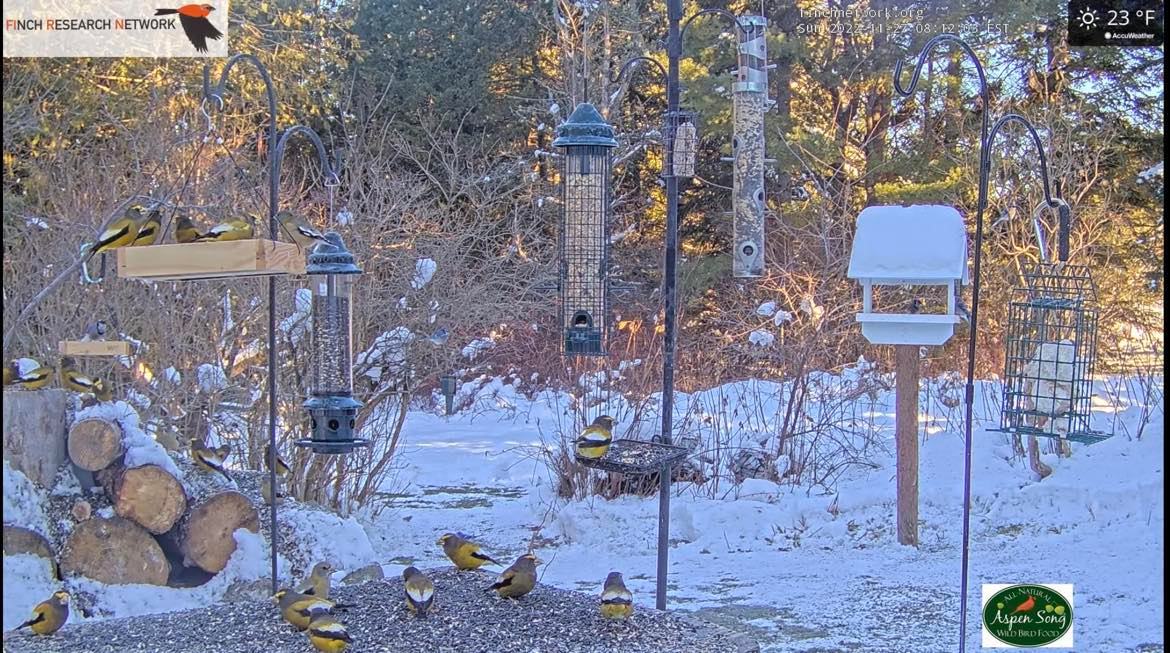Finch Research Network Feedercam:
https://www.youtube.com/@FinchResearchNetwork —
With the sponsorship of Aspen Song Bird Seed a feedercam for finches went up in Woodland Maine that will hopefully help educate about healthy bird feeding practices and also bring wellness for people through watching finches, which are perhaps most common cohort of birds at feeders across the world.
The health benefits of watching nature and birds are endless, and more and more studies continue to be published about these benefits, and if there was one silver lining to COVID, it was how people found calm and peace while engaging with nature whether by getting outdoors, or even by watching birds at feeders or on feedercams. Here’s a link listing several scientific studies about some of these benefits:
https://www.themindfulbirdingnetwork.com/scientific-studies

The Finch Research Network YouTube Channel link can be found below, but also at the top of the page using the YouTube icon: https://www.youtube.com/@FinchResearchNetwork
Always Remember Healthy Feeding Practices
1.Regularly clean feeders
The most effective way to clean bird feeders is a combination of washing with dish soap and then soaking them in a 9:1 bleach solution (i.e., 9 qt water to 1 qt bleach) for fifteen minutes. This should be done at least monthly, and if you have extra feeders, rotate them out with dry food as you clean the other feeders. Or put up fewer feeders—only the amount you can regularly maintain—and spread them out to reduce the concentration of birds. Be sure to let the feeders dry out before restocking, and always remember to wash your hands as well.
2. Clean bird baths
Use same solution as above, and try to give fresh water daily.
3. Clean areas under feeders frequently
Keep the feeding area clean by regularly raking up shells and droppings from under feeders periodically.
4. It’s best not to handle sick birds, let your local wildlife agency
know if you see sick birds.
For additional best practices see here as well: https://www.wbfi.org/feedsmart/
The Finch Research Network (FiRN) is a nonprofit, and has been granted 501c3 status. FiRN is committed to researching and protecting finch species like the Cassia Crossbill, Evening Grosbeak, finches of Hawaii (aka the honeycreepers) and more. The Evening Grosbeak has declined 92% since 1970. We are fundraising around an Evening Grosbeak Road to Recovery project in addition to a student research project, so please think about supporting our efforts and making a small donation at the donate link below.
On this year’s Giving Day, we are asking you to help us figure out why this happening, and support a Road to Recovery for the Evening Grosbeak.
Donate – FINCH RESEARCH NETWORK (finchnetwork.org)
From February through April 2022, members of our team (Finch Research Network (FiRN) Pennsylvania Natural Heritage Program at the Western Pennsylvania Conservancy (WPC) and Powdermill Avian Research Center at the Carnegie Museum of Natural History (CMNH)) ventured into the field in Minnesota and northern Maine to study Evening Grosbeaks, color-banding 62 birds and deploying 13 satellite tags and 30 nanotags. From the 13 satellite tags we’ve already received over 3000+ positions transmitted, and some birds moved to New Brunswick for the breeding season.

If people are looking for a nice holiday present now that the Holiday season is here, please check out this year’s awesome Finch Research Network x Bird Collective apparel series released a couple weeks ago.
There are also a few short sleeve Ts left of the Winter Finch Forecast and Evening Grosbeak Road to Recovery shirts as well.

#birds #birding #conservation #tshirt
We can also be found on FB, Instagram and Twitter at https://www.facebook.com/thefinchmasters and also on FB at Finches, Irruptions and Mast Crops.


